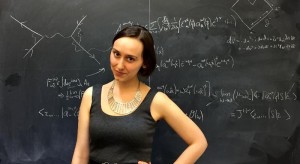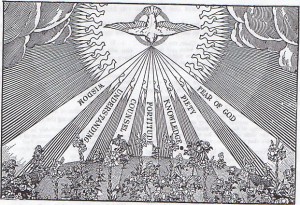
The other day, I saw an article making rounds through my facebook’s news feed about a brilliant young woman whom “Harvard believes is the next Einstein.” Having nothing better to do—I was recovering from a minor surgery—and since I generally enjoy topics of interest to the world of physics, I read the article. The young lady described therein, Ms. Sabrina Gonzalez Pasterski, is certainly a brilliant and hard-working, motivated individual with a very impressive resume to her name. I was particularly taken aback by her sole quote, placed at the end of the article: “Physics itself is exciting enough. It’s not like a 9-to-5 thing. When you’re tired you sleep, and when you’re not, you do physics.”
This comment may be innocuous enough-certainly it has been given no context by the peope who pulled this quote from an interview. Taken alone, there is no inflection, no hint as to how we should interpret it. It could express joy in the wonders discovered through the pursuit of physics (or of the science in general); this is how I take it to mean as expressed by Ms. Pasterski. I have, however, also seen similar words used to cover for a deeper sadness or resignation, or worse to insist that we should cease to turn our eyes innward towards our own moral state or upward towards God. A senior member of the tenure and promotion comittee of my university has certainly said as much to me, and on more than one occasion.

I have been told by this person that a successful scientist should “get off [of his] knees” and focus more on getting work done. In this view, a laboratory is a place of labor, that is, of work and even toil, the rewards of which might be some advancement of one or another field of knowledge, and (perhaps more importantly to the untenured) a publication [1].
Such a view of things overlooks the purpose of science, and for that matter of the labors invoved in our scientific laboratories. There is, after all, a second definition of labor, one which comes more naturally to the female half of humanity, and also to those men who are married and preparing to welcome children into their homes. I mean here that to labor is the process of giving birth the old-fashioned way, and indeed all of our other labors become a fainter echo of this when they bear us fruit.
To labor in life is to give birth, and in the laboratory it is to give birth to new knowledge. This is, however, actualy the lesser function of the laboratory. There is a second word and a second meaning hidden in the word “laboratory,” and it remains all the more hidden because of the obvious placement of “labor” at the front. The second purpose—which is the more important—is hidden at the back of the word, and is thus obscured by the labor, both within the word and within life. The word “laboratory” could be thought almost to be a contraction of the words “labor” and “oratory,” the latter being a place where we pray.

For what should we pray while laboring in the laboratory? In one sense, it is the same thing we ought to pray for when pursuing any other form of knowledge, whether in the classroom or in the library or study or where-have-you. We pray there for knowledge, since this is what we are usually seeking directly: the conformity of our thoughts with reality. But there is something better than knowledge, which can build on knowledge: wisdom, another gift of the Holy Spirit.
Wisdom enables us to see the ordering of the world, and ultimately to desire the greatest good first and the lesser goods in relation to this. Wisdom causes us to desire heaven above earth, God above nature. The Catechism of the Catholic Church notes that
“Because God creates through wisdom, his creation is ordered: ‘You have arranged all things by measure and number and weight.’ The universe, created in and by the eternal Word, the ‘image of the invisible God’, is destined for and addressed to man, himself created in the ‘image of God’ and called to a personal relationship with God. Our human understanding, which shares in the light of the divine intellect, can understand what God tells us by means of his creation, though not without great effort and only in a spirit of humility and respect before the Creator and his work. Because creation comes forth from God’s goodness, it shares in that goodness – ‘And God saw that it was good. . . very good’- for God willed creation as a gift addressed to man, an inheritance destined for and entrusted to him. On many occasions the Church has had to defend the goodness of creation, including that of the physical world” (CCC 299).
The verse quoted by the Catechism, “You have arranged all things by measure and number and weight” (Wisdom 11:21), was indeed one of the most popular verses during the time of the scientific revolution in Europe. It is also pertinent to role which wisdom should play in the scientist’s studies: namely, that the ordered-ness of the universe is something which can be studied only because there is a God Who creates, and moreover that this God desires us to know Him and to love Him. The order in the universe is thus built in part to point back to its Creator. Then again, there may be more than one sense in which nature might be read—underlying the physical order of nature is a moral order. Wisdom, in other words, does these three things for us as regards science:
- We should have—and most scientists do have—a sense of wonder concerning nature and its beauty and underlying order. Wisdom points to us that this wonder should be transformed into awe for the Creator of nature. We can appreciate nature, which is the art, but this should make us love God, Who is the Artist.
- Wisdom lets us see that the orderedness of nature points to our own internal orderedness. This is true on the individual scale and on the social scale. Everything in nature has its place and purpose: we too have both, and every integral part of us has its place and purpose as well. This is true not only physically, but spiritually.
- Wisdom transforms the laboratory from a place of only labor and toil, albeit labor after knowledge, into a place of prayer, an oratory. Note that I began by saying that we should pray for wisdom: one effect of wisdom is that we therefore are more inclined to prayer, both in praise and in gratitude.
 There is another insight which is granted with wisdom, and it is an old insight indeed. It was anticipated by Plato, who writes that while God is serious, man and human affairs are not: the whole world is “the plaything of God, and that is really the best this about it.” Therefore, “One should live out one’s days playing at certain games—sacrificing, singing, and dancing.”
There is another insight which is granted with wisdom, and it is an old insight indeed. It was anticipated by Plato, who writes that while God is serious, man and human affairs are not: the whole world is “the plaything of God, and that is really the best this about it.” Therefore, “One should live out one’s days playing at certain games—sacrificing, singing, and dancing.”
Commenting on this, Fr. James Schall says that
“This passage is the great prelude to the Christian notion that the world God made is not necessary to Him, that what goes on in it is not analogous to work or duty or determinism, bu to freedom, delight, and play, to things that are beautiful but not necessary, in the freedom of what need not exist but yet, when it does exist, is joyful and delightful….
[There is] in reality [a] profound connection between th highest thing and play, between the seriousness of God Whom we must approach in silent holiness and the fact that God’s holiness is our delight, to which we respond freely, happily, as Plato said, in ‘singing, sacrificing, and dancing,’ in liturgy, in praise. The real end and final holiday of human souls is to spend out lives at the most serious things; the blessed seriousness of God is worthy [of] the singing, the dancing, the sacrificing” (Schall on Chesterton).
This is also a challenge to those of us who have made or professions the study of nature—that is, the study of “the plaything of God.” There is order and beauty in nature, and some of the discoveries we make in studying this order may be useful to us. This is good—but it should not be the final nor greatest end of said studies. Rather, we should bear always in mind that we are studying a creation which exists above all to delight, to give joy and to evoke wonder. In this sense, “physics is not a 9-to-5 thing.” It ceases to be just work, and takes on some aspects of holy play: but exciting as physics is, it is also most certainly not “enough.” Rather, when rightly pursued, it has in fact the opposite effect of getting us “of our knees.”
—-Footnotes—-
[1] To be fair, “laboratory” is etymologically related to labor, as Stanley Jaki notes: in this case a very particular labor, that of making measurements (The Limits of a Limitless Science).






3 thoughts on “Work, Play, and Science”
Nice post – I was enlightened by the information ! Does someone know if I could find a blank a form form to fill out ?
Thanks for this JC…I’m also a physicist (retired) and I understand the attitude of those who think “science” is the end-all and be-all. That was my attitude before conversion; I wish i could go back and change it.
No sane person with decent education and understanding of human history can believe in god.
The Bible is a great example how people were manipulated – e.g. suicide was not a mortal sin, it was added later when hard working peasants started to kill themselves, expecting another, better life. This was a problem for the the then rulers, and the solution was so easy! The same with injustice – all religions share some kind of “final judgement” when the injustices will be rectified. Karma, Judgement…but the point is the same – to prevent people from rebellions against the rulers, against those who live at their expense. The poor folk just endured the injustice, expecting that one day they will be rewarded. It is a simple, yet strong manipulation that works in various forms across cultures. It is called “The Myth of a just world” because in reality, there is no justice, as there is no justice in bacterias killed by our lymphocytes…thinking there is just means you are too afraid to cope with the reality. PS: Now when it has been proven that an electrical stimulation of a certain part of our brain can produce out-of-body experiences, there is no room for any supernatural, sorry. Not to mention Sean Carroll’s explanation that the laws of physics unfortunately does not allow for any continuation of our consciousness…